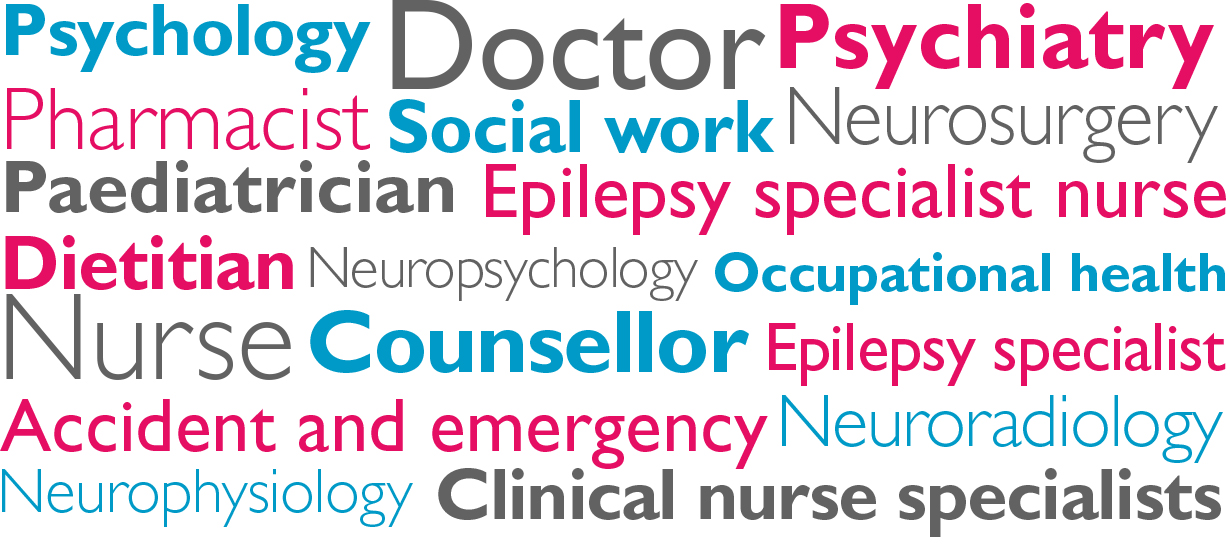
Healthcare system and roles
Fast facts
-
1In adults, epilepsy is normally diagnosed by a neurologist. If you were diagnosed as a child, you might have been diagnosed by a paediatrician
-
2People who have good seizure control will usually be signed off from neurology and see their GP for reviews
-
3If you have complex epilepsy or other conditions, you might be treated by a number of healthcare professionals working together. This is usually referred to as a multi-disciplinary team
-
4Healthcare services in the NHS are divided into primary care, secondary care, and tertiary care (more on this below)
-
5There are differences in the healthcare services available depending on where you live. You might find you have to travel to access some services
NHS healthcare
Healthcare services in the NHS are divided into primary care, secondary care, and tertiary care
Click or tap the cards
-
What is primary care?
Primary care provides the first point of contact to the healthcare system through your GP or pharmacist.
-
What is secondary care?
Secondary care is usually delivered in a hospital, but will sometimes be provided in a community based health centre.
It’s where diagnosis or planned care is provided. A&E departments are part of secondary care.
-
What is tertiary care?
Tertiary care is healthcare provided at specialist centres, usually based in larger hospitals. Tertiary care providers deliver highly specialist treatment or care, such as neurosurgery. It includes specialised tests and assessments.
Who you might see about your epilepsy
A wide range of healthcare professionals might be involved in your care – for example:

Healthcare roles and epilepsy
Here we look in more detail at some of the different healthcare professionals you might see.
-
GP
GPs have a role before and after diagnosis, including:
- Referring to specialist(s)
- Prescribing medicine(s)
- Support to help you manage your epilepsy
- Identifying any new health issues
-
Pharmacist
Your prescriptions will be collected from a pharmacist. Pharmacists provide the following services:
- Dispensing of NHS prescriptions
- Repeat prescription services (with agreement from your GP)
- Emergency supplies of medicine (subject to the decision of the pharmacist)
- Non-prescription medicines like paracetamol
- Disposal of unwanted or out-of-date medicines
- Advice on treating minor health concerns and healthy living
- Helping you to understand the correct dose and how often a medicine needs taking
To learn more about managing your prescriptions, see the page about prescriptions
-
Epilepsy specialists
An epilepsy specialist is the doctor you see at hospital about your epilepsy. On this website when we say epilepsy doctor, that’s who we mean.
Epilepsy specialists diagnose epilepsy and plan your epilepsy treatment and care. Who you get referred to will depend on what is available in your area.
If you are aged under 18 your specialist is likely to be a paediatrician (a doctor who treats and cares for children) with experience of diagnosing and treating epilepsy.
For adults whose epilepsy and seizures are not controlled the epilepsy specialist is likely to be a neurologist. This is a doctor specialising in the diagnosis and management of conditions affecting the brain and nervous system including epilepsy.The role of an epilepsy specialist can include:
- Making a diagnosis
- Providing information
- Arranging access to an epilepsy specialist nurse, if available in your area
- Making decisions about referrals for tests or to tertiary services
- Working with you to find the right treatment
- Epilepsy healthcare reviews
- Helping with the move (transition) from children’s (paediatric) to adult services. To learn more see the page about transition
-
Epilepsy specialist nurse
If available in your area an epilepsy specialist nurse (ESN) is ideally part of your care. This is someone you can contact between scheduled appointments.
ESNs are trained and have experience in caring for people with epilepsy. They can provide a link between you and other people involved in your care.The role of an ESN can include:
- Making sure you are getting the right help and support from other healthcare professionals
- Liaising between services and visiting at home and school/college if necessary
- Providing information, emotional support, and referring to other professionals, such as for counselling
- Providing emergency medication plans and training
- Giving advice about your epilepsy medicine(s)
- Running clinics
- Helping with the move (transition) from children’s (paediatric) to adult services

Making a complaint
If you’re not happy with your treatment you might want to raise this with a support service that can help you to resolve issues and advise on complaints processes.
Who to contact is different depending on where you live in the UK:
Top tips
- If you need information from your epilepsy doctor, sometimes your GP may be able to get an answer from them more quickly than you could
- Another way of reaching your epilepsy doctor could be to contact their secretary and ask if they can pass your question on
- Check if there is an epilepsy specialist nurse (ESN) where you live. To find out what there is in your area use the Epilepsy Action website and enter your postcode to search for epilepsy clinics near you
- If you have one, your ESN can often be reached more easily
- If you are really not happy with your epilepsy doctor, talk to your GP about this. They may be able to help get you referred to a different person
Do something
The NHS isn’t the only place that provides healthcare services. You might find there are groups, charities and local organisations that provide support where you live. What have you used that is local to you? What else can you find?







